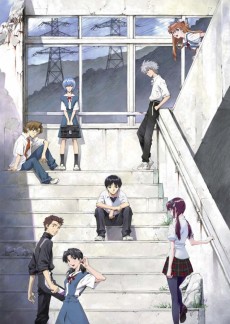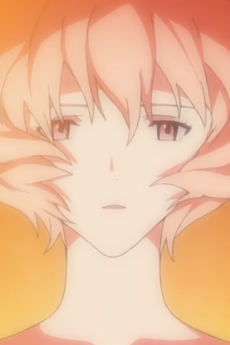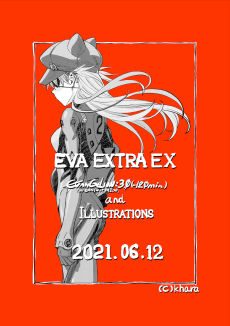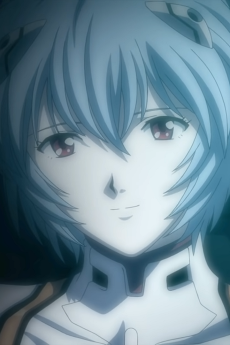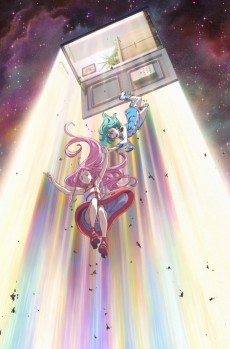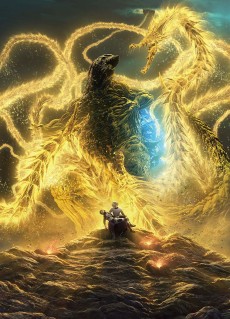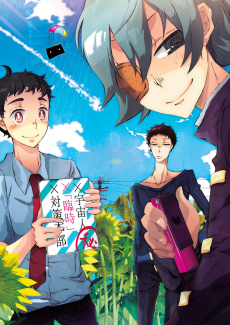EVANGELION SHIN MOVIE: KYUU
MOVIE
Dubbed
SOURCE
ORIGINAL
RELEASE
November 17, 2012
LENGTH
96 min
DESCRIPTION
14 years after third impact, Ikari Shinji awakens to a world he does not remember. He hasn't aged. Much of Earth is laid in ruins, Nerv has been dismantled, and people who he once protected have turned against him. Befriending the enigmatic Nagisa Kaworu, Shinji continues the fight against the angels and realizes the fighting is far from over, even when it could be against his former allies. The characters' struggles continue amidst the battles against the angels and each other, spiraling down to what could inevitably be the end of the world.
(Source: Anime News Network)
Note: Exists in several versions, as denoted by the version number:
• 3.0: Nov 17, 2012 - Original theatrical release
• 3.33: Apr 24, 2013 - Blu-ray/DVD release with minor visual changes.
• 3.333: Jan 8, 2021 - Theatrical IMAX screenings mastered in 2K with numerous small adjustments to lighting and color, as well as a new preview at the end of the film.
• Aug 25, 2021 - 4K Blu-ray release of 3.333
CAST
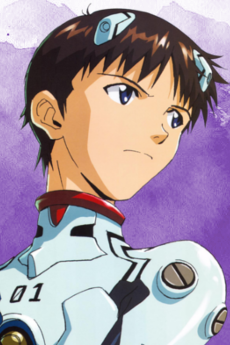
Shinji Ikari
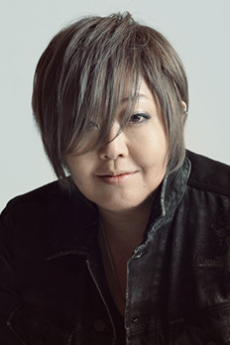
Megumi Ogata
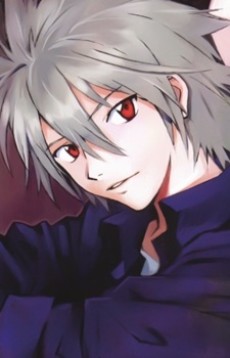
Kaworu Nagisa
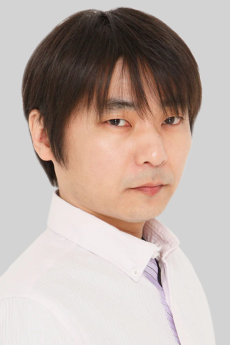
Akira Ishida

Asuka Langley Souryuu
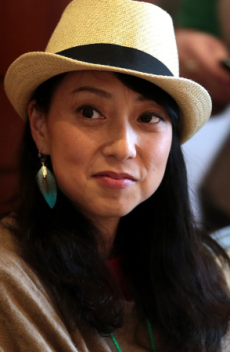
Yuuko Miyamura
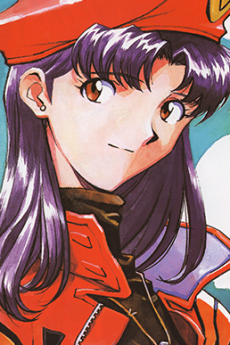
Misato Katsuragi
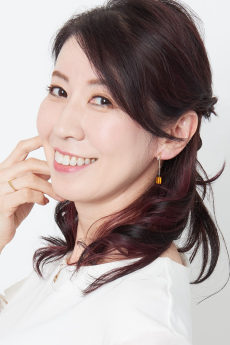
Kotono Mitsuishi
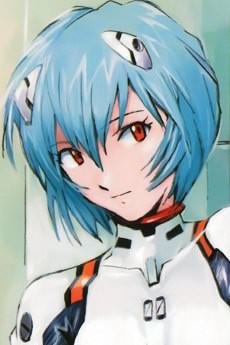
Rei Ayanami

Megumi Hayashibara
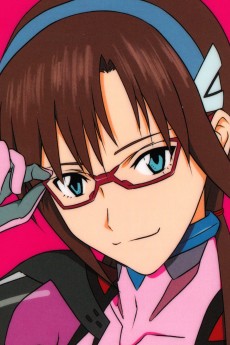
Mari Makinami Illustrious
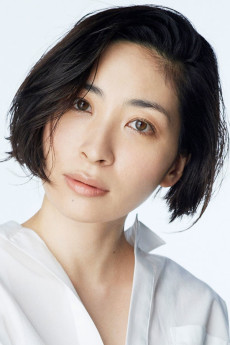
Maaya Sakamoto
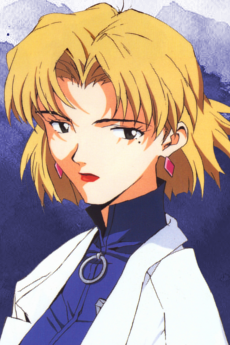
Ritsuko Akagi

Yuriko Yamaguchi

Gendou Ikari
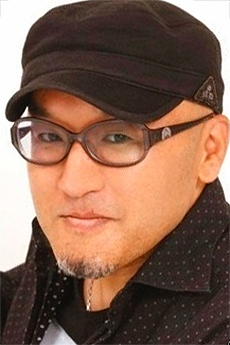
Fumihiko Tachiki
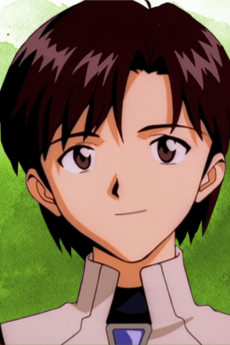
Maya Ibuki

Miki Nagasawa
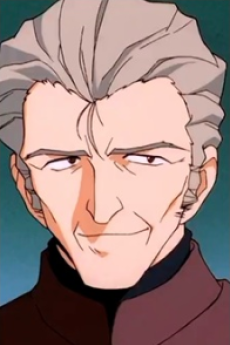
Kohzou Fuyutsuki
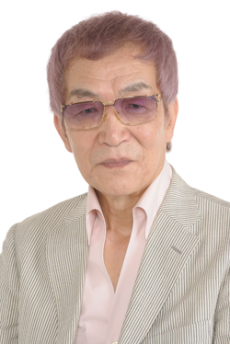
Motomu Kiyokawa
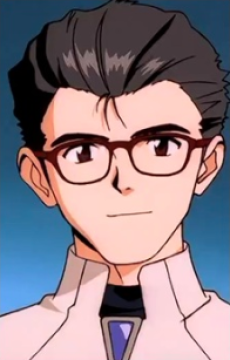
Makoto Hyuuga
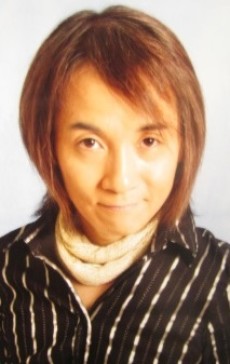
Hiro Yuuki
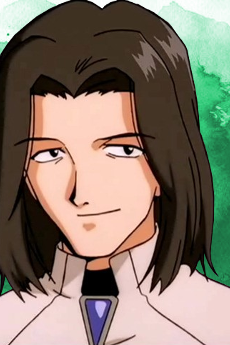
Shigeru Aoba
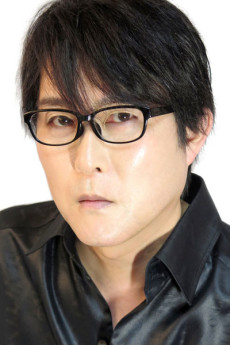
Takehito Koyasu
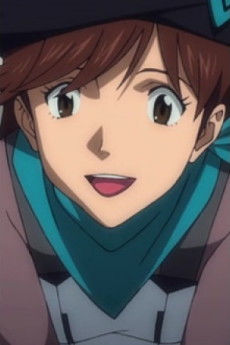
Sakura Suzuhara

Miyuki Sawashiro
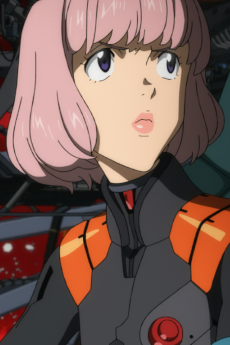
Midori Kitakami

Mariya Ise
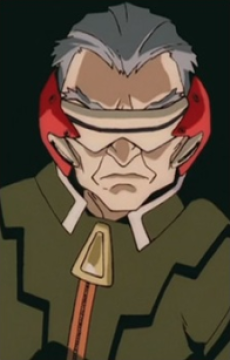
Keel Lorentz

Mugihito
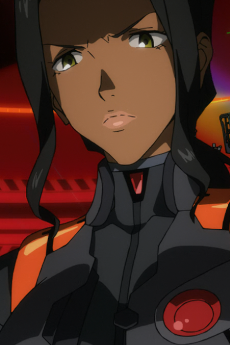
Sumire Nagara

Sayaka Oohara
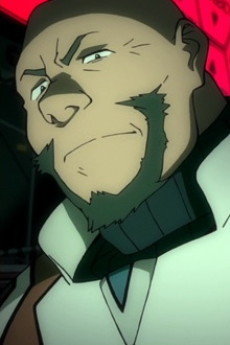
Kouji Takao
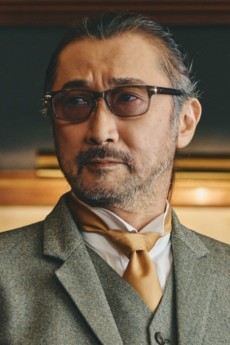
Akio Ootsuka
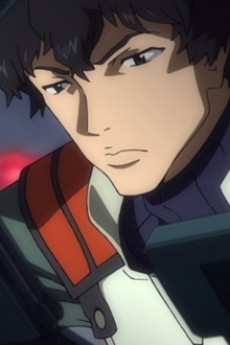
Hideki Tama
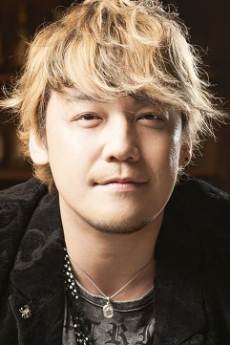
Anri Katsu
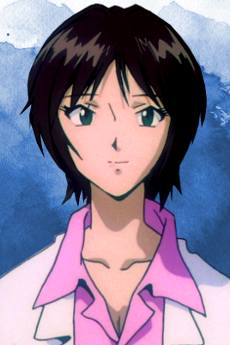
Yui Ikari
RELATED TO EVANGELION SHIN MOVIE: KYUU
REVIEWS

Revisionary
65/100Major plot deviations makes this third entry in the remake series extremely enigmatic at the cost of thematic coherencyContinue on AniListThe “Rebuild of Evangelion” tetralogy initially started out seeming like a shot-for-shot remake of the original “Neon Genesis Evangelion” series. While minor plot changes were introduced, there wasn’t much in the way of thematic deviations until the latter half of the second film, where drastic changes to both the characters and plots are made more readily apparent.
Completely disregarding the footage shown in its preview, “Evangelion: 3.0 You Can (Not) Redo” is the third entry in the “Rebuild” series and the first to fully embrace its new take on the critically-acclaimed series. Taking place in a completely different setting from its original, “3.0” is an astoundingly distinct entry in the series that, for the first time in the tetralogy, does not borrow anything from its source material. Fans of the original will be completely flabbergasted by the extreme character changes, radical new environments, and artistic direction in this entry.
But while the bold new direction the series is taking should be applauded, it should also be noted that “3.0” suffers from the fact that whereas its predecessors were character-driven,
“3.0” is plot-driven. This results in muddy character motivations and actions that don’t make much sense in the grand scheme of things. While there are reasons for said characters to change given that the movie does take place 14 years after the second, they are never fully explained in a way that makes sense.This film relies on its characters to act in a borderline passive-aggressive manner that alienates Shinji, the main protagonist, and results in him making irrational decisions that end up just creating more problems for everyone. Shinji’s actions are the result of him waking from a 14 year slumber and being confused about everything that’s going on. It’s bizarre how nobody takes the time to explain things to him and then are surprised when he decides to do something completely insane because he doesn’t know any better.
“3.0” suffers because it feels like Anno is trying to create an experience akin to that of “End of Evangelion.” Both films are mindboggling and confusing, but only the latter manages to do so in a way that feels like it has some kind of internal logic driving the madness.
“Neon Genesis Evangelion” was never about giving the viewers answers, but it was also never about creating questions for the sake of doing so. Sure, fans may continue to analyze the intricacies and mysteries of “Neon Genesis Evangelion” many years into the future, but even the casual viewer will have some semblance of a coherent plot. Character motivations in the original, although occasionally unclear, never feel out of place given the situations the characters are in. However, in “3.0,” there very rarely feels like a rhyme or reason to the thoughts and actions of its cast.
Of course, “3.0 + 1.0” will be making its debut in 2020, and perhaps that will clear up any questions viewers have in regards to “3.0.” As time goes on, I have no doubt that “3.0”’s status will change relative to its role in the tetralogy. But until then, this movie feels like a mishmash of odd ideas hamfisted in for the sake of shocking viewers.
In regards to other aspects of the film, the visuals, voice-acting, and sound design are top notch as expected of Khara. Even fans turned off by the film’s bizarre storytelling will be drawn in by its absolutely beautiful visuals.
Is this film a mess? Yes.
Is it a beautiful mess? Yes.
To conclude, “”Evangelion: 3.0 You Can (Not) Redo” isn’t a terrible entry into this series of remakes, but it also fails to live up to the strong performance of its two prequels. There is a lack of internal logic and coherency, and those two are more than enough to make this potentially lowest entry in the entire “Evangelion” franchise (aside from the series’ cashgrab spinoffs)

Pockeyramune919
65/100I Totally Did (Not) Enjoy the Direction they took the Rebuilds InContinue on AniList[
 ](https://anilist.co/review/13151)
](https://anilist.co/review/13151)__This Review Contains Spoilers for Evangelion 3.0 and End of Evangelion__ 
We return once more to Evangelion's Rebuild movies, this time taking a look at the last movie for the foreseeable future, Evangelion: 3.0 You Can (Not) Redo, the third installment in the planned tetralogy. As I stated before, each passing Rebuild movie deviates more and more from the original television show. 1.0 was largely the first few episodes of Neon Genesis Evangelion with a fresh coat of paint and 2.0 recapped the next arc but deviated more and more until it stunningly concluded with completely new material. I predicted that in 3.0, we'd chart completely new territory as the Rebuild continuity completely divorced itself from the television show.
And I was correct! But being new is one thing, being good is another thing entirely. With this in mind, what do I think of You Can (Not) Redo? How exactly does 3.0 fare next to its predecessors, whether that mean the rebuilds or the television show?
Unfortunately, I find myself criticizing the new direction. As it turns out, what’s new is largely old, in some ways.
Evangelion: 3.0 You Can (Not) Redo follows directly where 2.0 left off, with the third impact averted and Rei and Shinji trapped inside Unit 01 via the Spear of Cassius that Kaworu threw. With all signs pointing to them being responsible for the decimation of Tokyo-3, UN raids the Geofront and the NERV staff is incarcerated. Most importantly, this movie marks the moment in which The Children of the Rebuild — Rei, Asuka, Shinji, Mari, and Kaworu — will finally come together.

Whoopsie, just kidding! In reality, Evangelion: 3.0 You Can (Not) Redo takes place a whopping fourteen years after 2.0. The Third Impact was just narrowly avoided but not before obliterating Japan and killing off most of the world’s already fledgling population. Shinji wakes up after being comatose to discover a battle-hardened Misato as the head of a new organization, WILLE. The movie follows Shinji as he tries to discover what has happened to the world and figure out if he can save it with his new, mysterious ally, Kaworu Nagisa.
The first thing viewers will notice about 3.0 (well, assuming they’re the type to stick around after the credits) is that it completely deviates from the preview established at the end of 2.0. The children are in the same location, I suppose (though the Rei we know and love isn’t there), but it’s not so much a meeting, it’s a fight, and their interactions with one another are pretty fledgling. While the Third Impact has technically been averted, it might as well not have been, because the world is still ravaged. We don't see the NERV staff being incarcerated. Really, the only thing from the preview that made it to the film is the fact that Asuka wears an eyepatch now. I'd encourage viewers to skip the preview, as it just makes the opening of the movie more confusing.
It can be pretty hard to parse out what's going on in the film. The timeskip from 2.0 to this one doesn't help in this regard as it takes a moment before we even realize we've gone fourteen years into the future. From a viewer standpoint, one moment everything is fine and everything has gone to crap in the next. It's fine for movies to have timeskips between installments, but there's usually context that makes the skip less jarring. Off the top of my head, I can think of three series that pulled it off a lot more gracefully. There's a five-year timeskip during the Avengers duology of Infinity War and Endgame. The latter picks up right after the first and has a timeskip after the movie has started, ensuring that viewers have the payoff to the previous plot threads while simultaneously making the timeskip obvious. There's a ten-year timeskip between episodes I and II of Star Wars, but time jumps between movies have been established at this point and the events of I had wrapped up sufficiently so that a timeskip wouldn't be jarring. Hell, the second Indiana Jones movie, Temple of Doom, takes place one year prior to the first, but it essentially doesn't matter, since the previous film wrapped up so nicely that viewers could easily jump into the next, establishing the episodic nature of these films. It might seem off-topic to talk about Hollywood films in an anime review, but it's to establish how 2.0 fumbled its handling of the timeskip and ultimately made for a more confusing experience than it needed to be. It's not only confusing, but its unsatisfying; 2.0 didn't wrap up nicely; the ending built a lot of momentum and plot-threads that were ultimately discarded due to the timeskip.

My bare synopsis gives you much more information than the movie itself gives viewers. As you can surmise, this makes for a disorienting experience. I'd urge for new viewers to read a brief synopsis going in, as it'll help a lot in getting acclimated to the new world. Many questions were buzzing in my head throughout the film and they really only began to be answered at the halfway mark of the film. Even then, the answers weren't really satisfactory and raised as many questions as they answered. I've heard the movie isn't newcomer friendly, but I think the point is moot, because I watched the original series and I still didn’t really know what happened. Since I have watched the original series, I knew it would be a good idea to check fan encyclopediae like EvaGeeks for answers. So, like the original series, you'll have to rely on supplementary materials if you hope to understand 3.0.
A counter-argument to my criticism could be that this is the point. Shinji has woken up after being in a sort of stasis for fourteen years. As such, he doesn't know what's going on, so it would only make sense that we, the viewers, similarly don't understand what's happening. I'll concede that this certainly makes sense, but unfortunately, I don't really care. While it's certainly artful that the structure of the movie emulates Shinji being a fish out of water, it doesn't make for a very pleasurable viewing experience. Annoyance being intentional doesn't change the fact that I'm annoyed.
In my review of 2.0, I stated "[the Rebuilds are] a new continuity, a seemingly more hopeful one. A continuity in which, even if characters must go through horrible trials to get there, there's a light at the end of the tunnel."

I greatly, disastrously misread the last movie, or at least what the movie meant moving forward. Evangelion: 3.0 You Can (Not) Redo vehemently spits in the face of any hopeful interpretation of 2.0's ending. For facing his fears and following his heart to save the girl he loved, Shinji is brutally, mercilessly punished. He's initiated Third Impact (somehow), resulting in him being the catalyst for the (newest) apocalypse. His worst fears are realized in that everyone hates him. He's robbed of his newfound purpose due to him being barred from piloting an Eva. Most damningly, the girl he loved has seemingly perished despite his efforts, making all the pain he's caused for naught. And that's only the beginning of the film; things get far, far worse at its end.

Unlike the hopeful, yet still tense movie I imagined, 3.0 is oppressively depressing and hopeless, with constant reminders that the world has been irrevocably damaged and Shinji's to blame. We watch Shinji descend further and further into madness and despondency. There's not much hope to be had, but there's just enough to get stamped out at the end, breaking Shinji (and the audience) further. There's a gloomy tone throughout, making it more tonally boring than 2.0 and more tonally off-putting than 1.0.
To be clear, there's nothing wrong with a bleak show; some of my favorite anime aren't the happiest. There is, however, something fundamentally undesirable about a show that basks in bleakness, because when everything's dark, nothing really is and you stop caring because it's all the same in its unpleasantness.

Honestly, my aversion could just be due to my own expectations. The ending of 2.0 did seem hopeful, it was sweet, but 3.0 retroactively made it this horrible choice of Shinji's all so that it could foster a depressing tone. It just feels so out of left field in light of what was built up. As an Evangelion veteran, this isn't exciting, we already got a depressing tone in the original. It actually reminds me of End of Evangelion in its unflinching, exhausting bleakness. A question I had after the movie was "what's the point?" What's Anno hoping to achieve with this reimagining if it ultimately comes out to be the same as the original? Oh sure, the setting might be different, but the takeaway seems like it'll be largely the same. Currently, it seems like it's hitting the same beats as the original, but worse.
Like in 1.0, the theme of the movie shines clearly. Towards the end of the movie, Shinji's goal is to reverse the damage he caused, "redoing" his time with the Evangelion. Kaworu even lulls Shinji into thinking redos are feasible. He states that, to get good at the piano, Shinji must keep playing a piece until he is satisfied with it. One look at the title shows that Shinji must learn that this lesson doesn't apply to life; no matter how hard one tries, they can't change the past, they cannot amend past mistakes, they must simply live with the horrible consequences. 3.0 also retroactively reveals the theme of 2.0. Namely that, no matter how hard you try, you can't advance in your relationships, you can't advance towards a brighter future; your efforts will only blow up in your face. You can even take these themes to a metatextual level. No matter how much fans may want it, Evangelion won't advance to become a happier series; there won't be a "redo" of the series in which everyone is happy in the end. Like Shinji with the events of the third impact, trying to "redo" Evangelion only results in a product that's as depressing as the original. Again, I'm left asking, "what's the point?" This sentiment could have been made by simply not making any more Evangelion-related works. Why spend millions of dollars to essentially flip off the audience? Burning money while angrily tweeting about the Evangelion fan base would have achieved the same effect with less hassle.

For what it's worth, the rebuilds are apparently supposed to be more hopeful than the original. It should also be noted, however, that production of 3.0 caused Anno to relapse back into depression. Make of this information what you will.
One thing I've heard is that the Rebuild series is happier due to the characters being less messed up. This sentiment only works in regard to the first two movies. It's true that in the rebuild continuity, Shinji is less cowardly and morose, Rei emotes more, Asuka is less of a gremlin, and Misato has more social moors and is less of a (possible) predator. These changes make it easier for some to empathize with the characters, but on the flipside, this makes it more heartbreaking when they suffer great misfortune.

Speaking of which, this go around, the characters were fine, I suppose. They didn't really grab me as much as before. Shinji acts in a manner you'd expect for a young man who just discovered that he caused the apocalypse while trying in vain to save his crush. While she goes back to being prickly, I still prefer this version of Asuka, who I like to call Pirate Asuka. Arrghsuka, if you will. Sure, she's an ass to Shinji, but it seems like she has a legitimate reason to be this time around, instead of being a general bully. Plus, I like the unique angle of her being a grizzled war veteran. I'm not sure it's fair to say that they reversed her character development from the last film; we see Asuka in a very different world than the last movie (another problem with the timeskip). However, that doesn't change the fact that, at least on the surface, it very much seems like the old Asuka.

Speaking of grizzled veterans, I was really interested in what they did with Misato. Gone is the bubbly, yet no-nonsense team mom, replaced with a stoic commander. Despite all of this, she still harbors affection toward Shinji as evidenced by the fact that she doesn't blow him up when she has the chance. It's a shame Misato is barely in the movie, though she certainly makes an impact in how starling her transformation is. Gendo is more the same, though somehow even a bigger jerk than he was in the television show.

I was sorely disappointed to see that Mari still has a bit part. Sure, she has a bigger role than in 2.0, but she’s still hardly in the movie. She's still a treat whenever she's on the screen though. This only makes me want more of her. At this point, I'm resigned to the fact that if I want to see more Mari, my best bet is buying figures of her.
Honestly, most of the characters saw little screen time. The only ones who were prominent were Shinji and Kaworu. Kaworu stole the show after having glorified cameos in the previous two movies. I love how he's so supportive of Shinji. Their chemistry was amazing and there was electric bishounen BL energy whenever they were on the screen. They even changed his design from previous movies to give him softer features. I'm half-surprised there wasn't a kiss.


But of course, this is 3.0 we're talking about. Kaworu tragically dies while stopping another impact, his blood splattering all over the Evangelion cabin next to Shinji, traumatizing the poor boy further as he's robbed of two people who unconditionally loved him. After two movies of teasing, it feels like such a waste to kill him after one movie. But I suppose they're just trying to emulate the show.

The action scenes were decent, though they felt more sporadic this time around. The pacing of this movie made it feel like not a lot happened when some pretty big things did unfold, plot-wise. I attribute this to the pacing and structure, which is mostly Shinji either moping or bonding with Kaworu. For what it's worth though, I did think Evangelion Unit 013, with its dual cockpit, was pretty awesome.
The art direction is still great and a standout scene is Shinji losing his grip on reality after finding out that he didn't save Rei. This makes for a very uncomfortable scene as Shinki walked in front of a shifting background with a wide-eyed, haunted expression on his face.
At first, I was going to say the music was worse, but upon listening to the OST again, I have to admit there are quite a few gems, some of which I added to the review. Unfortunately, 3.0 doesn't feature a rendition of Decisive Battle.

There are certainly things I liked about Evangengelion: 3.0 You Can (Not) Redo: the battles were pretty cool, Kaworu played off of Shinji nicely, and the setting itself was interesting. But these are overshadowed by my grievances including many characters' lack of screentime, the fumbling of the timeskip, and the dismal tone of the movie that departs from 2.0’s. After being so excited at the end of 2.0, I'm really disappointed in the direction Anno decided to take 3.0. 3.0 while being new, ends up taking too much of what I don’t like about the original series to fully enjoy it.
6.5/10
D
I've seen Neon Genesis Evangelion being likened to Star Wars in popularity, some going so far as calling it the Star Wars of anime. Taking this analogy a step further, we could say the Rebuilds would be the Sequel Trilogy of anime. The momentum built by 2.0 and The Last Jedi is squandered by The Rise of Skywalker and 3.0. In both series, I was prepared to like the sequel/reimagining more than the original, but the latest installment sullied my goodwill. The rebuilds, however, have something that the Sequel Trilogy doesn't. The rebuilds haven't concluded yet. The rebuilds could very well turn themselves around and leave a tetralogy that I enjoyed overall. For now, I remain cautious in my optimism.


planetJane
78/100Maybe none of this was ever worth it.Continue on AniList*All of my reviews contain __spoilers __for the reviewed material. This is your only warning.*
*”You stumble, through questions* *That you could never answer*” By its nature, the third Rebuild of Evangelion film offers no definitive and final statements on anything. Not on Shinji nor any of the other characters. Not on Evangelion-The-Franchise. Not on its genre or its medium. Not on broader philosophies of art or the world. Not even on the literal events of its own plot. It is, fundamentally, incomplete. As much as any piece of criticism attempts to reckon with the film, it must too reckon with this fact. To write on any part of the mainline Evangelion series is to acknowledge that what you are writing doesn’t matter and may well be entirely wrong.
Yet, for all its incompleteness and intermittent obtuseness, Rebuild 3 does induce a wide variety of feelings in the audience. Largely not pleasant ones, either. Throughout, Rebuild 3 feels, to its core, sick, fake, cynical, wrong. Not in the same shellshocked-to-near-death sense as End of Evangelion. It is more akin to being many years into reckoning with your own neuroses, when even the breakdowns, the severed friendships and burned bridges, the self harm, and the unhealthy coping mechanisms, all of that, begins to feel as much an annoyance as anything else. It is “Oh God, are we doing this again?” in film form.
What is “This”? As with much well-accomplished art, the Rebuild films are open to broad interpretation. Throughout, I found myself contemplating Rebuild 3’s relationships to the franchise’s broader themes dealing with the bleakest parts of mental illness, but also with the franchise itself. Certain shocks of imagery do, definitely, feel like pointed commentary on What Evangelion Has Become. A few stretches of the film feel downright sickened by the whole thing. Evangelion, in another time and place on the internet, was compared--in terms of influence on its country’s pop culture--to Star Trek.
Parts of the Rebuild films and the third in particular, seem to ask if it’s been worth it. There is a reason the infamous “ME!ME!ME!” music video chose to portray its doomed otaku protagonist as having specifically Eva figurines. Conversely, you certainly don’t have to toss many stones to hit someone who’s of the opinion that Evangelion “ruined mecha anime”, it was something of a stock contrarian otaku take for years. In certain niches of the internet, it still is.
*Intentional or not, imagery of malformed and damaged NERV logos, empty headquarters, and mass-produced plugsuit gloves cannot help but feel pointed.*
Elsewhere, the film lacerates the character of Shinji so thoroughly and mercilessly that it seems to mock the very idea of a heroic narrative. This is especially true toward the film’s end, where Shinji once again fails to learn from his mistakes and once again nearly causes the end of the world. If Rebuild 3 has a major flaw, it’s perhaps that it makes it all too easy to distance yourself from Shinji. Many of us carry heavy weights on our shoulders, but certainly few of us are guilty of causing most of an apocalypse. Twice. The one moment of reprieve he gets--his relationship with Kaworu--ends in explosive death, because he cannot bring himself to trust another person.
The magnitude of one’s failures certainly can feel like the end times, so the impulse is understandable, but at some point this starts to all feel a bit like penance whipping. How many times do we need to watch Shinji ground to dust? He’s barely alive by film’s end, literally dragged around by the wrist by Asuka as he finally is forced to leave the tape recorder he’s clung to since the opening episodes of the original series behind. Maybe there is development in this version of the character’s future, maybe there is not. Hell, maybe he deserves all this, for his failure to rise to the occasion thrust upon him, or simply for being an abusive ass in End of Evangelion. In the moment, none of these questions feel relevant. Rebuild feels defeatist and anti-triumphant by design. It’s horrifically reductive to phrase it this way, but it occasionally feels like an evil twin of Gurren Lagann. It is a nightmarish, browbeating apocalypse. A planet, and a narrative, crucified.
Evangelion on the whole inspires endless contemplation. Articles, websites, and so on exist that tear the franchise down to individual frames. It is a world one can get lost in, if they’re not careful, and it’s easy to gaze hopefully to the sanctioned creators--the “canonical” source of all this, whether they're Anno or not--and pray for reprieve and finality. But if the New Century Gospel needs a Book of Revelation, it’s not to be found in Rebuild 3. None of this is to detract from the film’s immense artistry. It is, by any conventional metric, a good movie. It’s just not a very inspiring one. Which, of course, is not something every film--or any film--needs to be, but it's not difficult to divine where the sharp divergences of opinion on Rebuild, and this film specifically, come from. It is easier to respect than like and easier to like than love.
The irony is that Rebuild 3’s highs and lows, are, fundamentally the same as those of the entire series. This is an anime about Shinji. I struggle to think of many other fictional characters so utterly damned by their being such. You can play the tapes over, starting from episode 1 of the original series, as many times as you like. The story in them will never change.
And if you liked this review, why not check out some of my others here on Anilist?
SIMILAR ANIMES YOU MAY LIKE
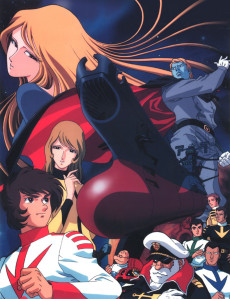 ANIME ActionUchuu Senkan Yamato
ANIME ActionUchuu Senkan Yamato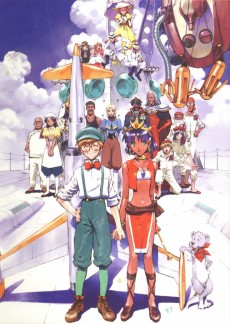 ANIME AdventureFushigi no Umi no Nadia
ANIME AdventureFushigi no Umi no Nadia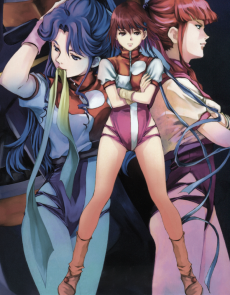 OVA ActionTop wo Nerae! GunBuster
OVA ActionTop wo Nerae! GunBuster ANIME Action86: Eighty Six
ANIME Action86: Eighty Six ANIME ActionKaijuu 8-gou
ANIME ActionKaijuu 8-gou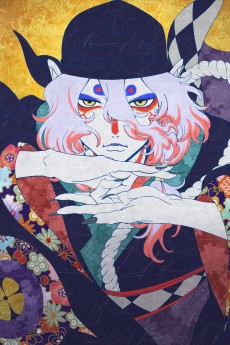 MOVIE FantasyMononoke: Karakasa
MOVIE FantasyMononoke: Karakasa
SCORE
- (3.75/5)
TRAILER
MORE INFO
Ended inNovember 17, 2012
Main Studio Studio Khara
Trending Level 4
Favorited by 1,867 Users


